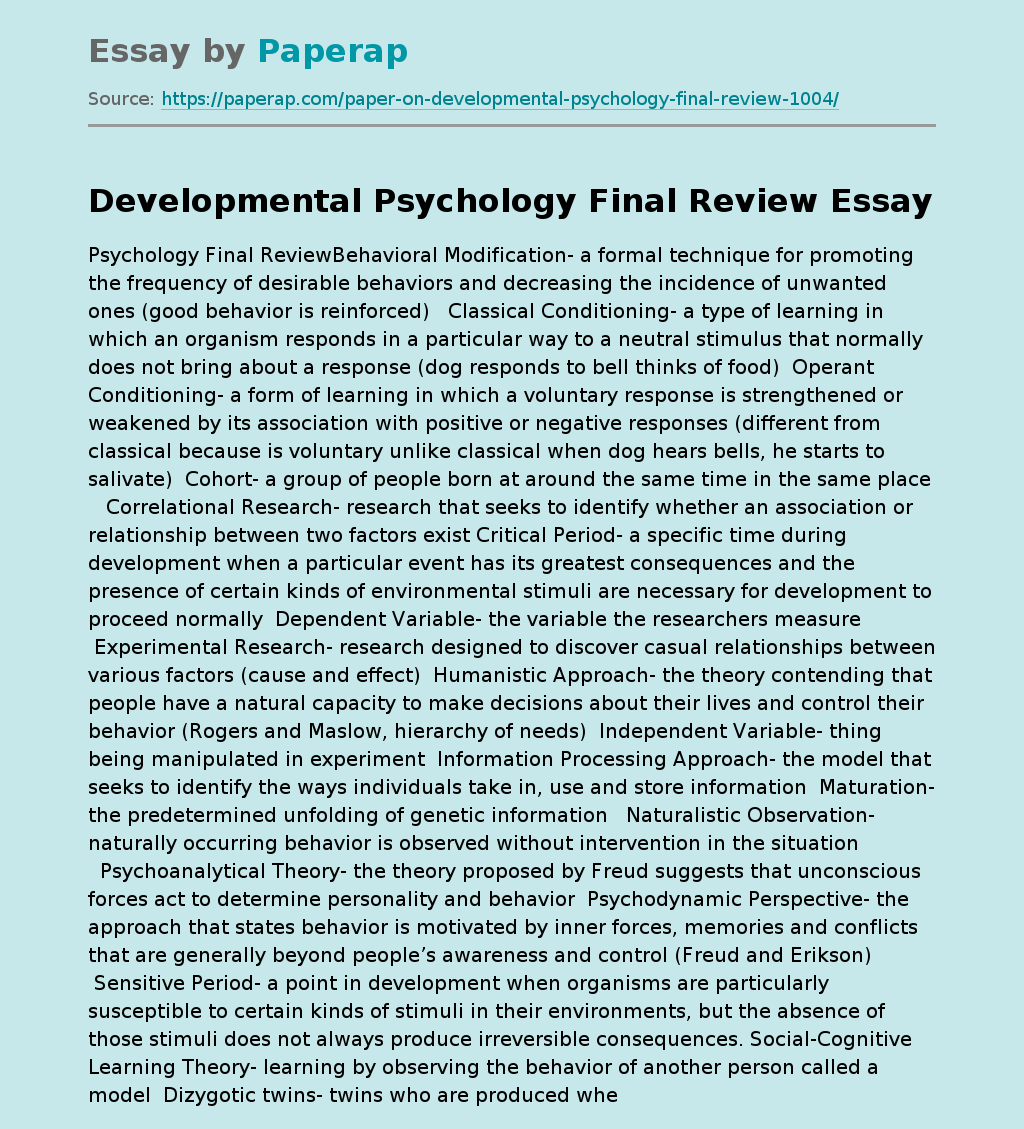Developmental Psychology: Key Terms
Behavioral Modification- a formal technique for promoting the frequency of desirable behaviors and decreasing the incidence of unwanted ones (good behavior is reinforced).
Classical Conditioning- a type of learning in which an organism responds in a particular way to a neutral stimulus that normally does not bring about a response (dog responds to bell thinks of food).
Operant Conditioning- a form of learning in which a voluntary response is strengthened or weakened by its association with positive or negative responses (different from classical because is voluntary unlike classical when dog hears bells, he starts to salivate).
Cohort- a group of people born at around the same time in the same place.
Correlational Research- research that seeks to identify whether an association or relationship between two factors exist.
Critical Period- a specific time during development when a particular event has its greatest consequences and the presence of certain kinds of environmental stimuli are necessary for development to proceed normally.
Dependent Variable- the variable the researchers measure.
Experimental Research- research designed to discover casual relationships between various factors (cause and effect).
Humanistic Approach- the theory contending that people have a natural capacity to make decisions about their lives and control their behavior (Rogers and Maslow, hierarchy of needs).
Independent Variable- thing being manipulated in experiment.
Information Processing Approach- the model that seeks to identify the ways individuals take in, use and store information.
Maturation- the predetermined unfolding of genetic information.
Naturalistic Observation- naturally occurring behavior is observed without intervention in the situation.
Psychoanalytical Theory- the theory proposed by Freud suggests that unconscious forces act to determine personality and behavior.
Psychodynamic Perspective- the approach that states behavior is motivated by inner forces, memories and conflicts that are generally beyond people’s awareness and control (Freud and Erikson).
Sensitive Period- a point in development when organisms are particularly susceptible to certain kinds of stimuli in their environments, but the absence of those stimuli does not always produce irreversible consequences.
Social-Cognitive Learning Theory- learning by observing the behavior of another person called a model.
Dizygotic twins- twins who are produced when two separate ova are fertilized by two separate sperm at the same time (fraternal twins).
DNA- he substance that genes are composed of that determines the nature of every cell in the body and how each will function.
Embryonic Stage – the period from 2 to 8 weeks Fetal Stage- the stage 8 weeks- till birth.
Genotype- the underlying combination of genetic material present (but not outwardly visible) in an organism.
Germinal Stage – the first and shortest stage of prenatal period, first two weeks following conception.
Monozygotic twins- identical twins Phenotype- an observable trait, trait that is actually seen.
Zygote- the new cell formed by the process of fertilization.
Post-mature Infants- Infants still unborn 2 weeks after the mother’s due date.
Reflexes- unlearned , organized, involuntary responses that occur automatically in the presence of certain stimuli.
Cerebral Cortex- the upper layer of the brain.
Myelin- a fatty substance that helps insulate neurons and speeds up the transmission of nerve impulses.
Neuron- the basic nerve cell of the nervous system.
Plasticity- the degree to which a developing structure or behavior is modifiable due to experience.
Principle of the independence systems- the principle that different body systems grow at different rates.
SID’s- the unexplained death of a seemingly healthy baby.
Synapse Synaptic Pruning- the elimination of neurons as the result of nonuse or lack of stimulation.
Accommodation- changes in existing ways of thinking that occur in response to encounters with new stimuli or events.
Assimilation- the process in which people understand an experience in terms of their current stage of cognitive development and way of thinking.
Babbling- making speech-like but meaningless sounds.
Information Processing Approaches- the model that seeks to identify the way individuals take in, use and store information.
Object Permanence- the realization that people and objects exist even when they cannot be seen.
Overextension- the overly broad use of words (all cars are trucks).
Scheme- an organized pattern of sensorimotor functioning.
Sensorimotor Stage (of cognitive development) – Piagets initial stage of cognitive development has 6 substages.
Ainsworth Strange Situation- a sequence of staged episodes that illustrate the strength of attachment between a child and mother .
Ambilivalant Attachment- a style of attachment in which children display a combination o f positive and negative reactions to their mothers, they show great distress when mother leaves, but upon her return they may imultaneously seek close contact but also hit and kick her.
Autonomy vs Shame and Doubt- (aged 18 months to 3 years) develop independence and autonomy if they allowed the freedom to explore or shame and self-doubt if they are restricted or overprotected.
Avoidant Attachment Theory- a style of attachment in which children do not seek proximity to the mother.
Empathy- an emotional response corresponds to the feelings of another person.
Midlife crisis – a stage of uncertainty and indecision brought about by the realization that life is finite.
Sandwich generation – couples who in middle adulthood must fulfill the needs of both their children and their aging parents
Developmental Psychology: Key Terms. (2017, Dec 28). Retrieved from https://paperap.com/paper-on-developmental-psychology-final-review-1004/

